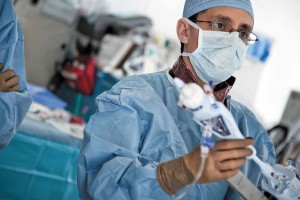Clinical
Division of Cardiovascular Medicine
CLINICAL ACTIVITIES

UVA Cardiovascular Medicine’s Scott Lim, MD, performing valve surgery.
Clinical Procedure Statistics
In FY 2015, division faculty performed more than:
– 2,000 diagnostic catheterizations
– 850 interventional catheterizations
– 90 peripheral interventions
– 2,000 electrophysiology procedures
– 600 electrophysiology device implants
– 14,000 echo, TTE and TEE* tests
*echocardiogram, transthoracic echo and transesophageal echo
Quality & Safety Efforts
– Implemented Be Safe methods with focus on mortality, central line-associated bloodstream infection, catheter-associated urinary tract infection, staff safety, pressure ulcers and falls
– Develop and stabilize nursing staff
– Create standard work for transfers and rounds
– Structured reviews of Be Safe Events
– Daily checklists implemented for physician rounds
– Real-time team huddles created for Coronary Care Unit becoming model for UVA Medical Center
- Clinical Leadership
- UVA Heart Failure Program Wins AHA Quality Award
- Treating Heart Valve Disease With Less Invasive Procedure
The UVA cardiovascular program continues to expand its national reputation in many areas. We have done this by growing areas of excellence and innovation, increasing patient access to providers and strengthening focus on quality and safety.
The internationally known electrophysiology section continues to evolve. We recently acquired the Sensei® robotic catheter system, providing significant enhancements to maneuver catheters into difficult-to-reach places in the heart. Faculty additions in vascular medicine and vascular intervention have positioned the division for growth in this core service line; an urgent care clinic has eased access to cardiovascular physicians by allowing acute heart patients to bypass the emergency department; and UVA’s new outpatient clinics to the north, east and west of Charlottesville have expanded the division’s clinical footprint. Our cardiovascular physicians are renowned in the area of noninvasive cardiac imaging, where new modalities are invented, not just tested, and an expanded percutaneous valve program has gained national recognition.
Atrial Fibrillation
Atrial fibrillation, a condition in which the heart beats irregularly — either too fast or too slow — affects an estimated 3 million people in the U.S. and leads to a fivefold increase in risk for stroke. The division’s Atrial Fibrillation (“A-fib”) Center, directed by electrophysiologist J. Michael Mangrum, MD, continues to be at the international forefront of A-fib patient care, education and research. UVA was the first site to implant an FDA-approved pacemaker for patients with congestive heart failure and A-fib in 2004; more recently, Mangrum was the first physician in the U.S. to use the newest type of ablation catheter, which assesses contact inside the heart chamber.
UVA is also a major contributor to most clinical trials in this area, offering additional treatment options to patients. Mangrum and his colleagues are seeking to revolutionize the understanding and treatment of the condition at the AFC by creating an atrial fibrillation institute that would bring together interrelated disciplines to better understand the causes of A-fib, develop and implement innovative treatments and assure the best care for patients. Private support is needed to make this program a reality. “UVA is poised and ready to become the national and international leader in research, education and comprehensive treatment of atrial fibrillation,” Mangrum says. “We have the expertise, the collaboration and the clinical foundation to create an institute that will bring together the best minds across the globe to focus on A-fib.”
STEMI Care at UVA Wins Award
In 2014, UVA Health System received an award from the American College of Cardiology and the American Heart Association that recognizes improvements in care for patients with ST-Elevation Myocardial Infarction (STEMI) heart attacks — one of the most serious types. In 2014, only 55 hospitals received the “Get With the Guidelines Gold Performance Achievement Award” in this category.
UVA, Bon Secours Expand Heart Care Partnership
University of Virginia Health System and Bon Secours Health System signed a nonexclusive agreement in January 2015 to create and expand partnerships in cardiovascular services, cancer, physician recruitment, population health, patient safety and undergraduate and graduate medical education.
The heart care partnership included the introduction of transcatheter mitral valve repair to Bon Secours St. Mary’s Hospital in Richmond, Va., and an academic affiliation between Bon Secours and UVA School of Medicine enables UVA medical students to perform clinical rotations at Bon Secours facilities in Richmond as part of their education.
UVA Finds Stroke Prevention Success with WATCHMAN™
Cardiovascular Medicine faculty successfully utilized the WATCHMAN™ device to treat left atrial thrombosis, a therapy that could replace the use of blood thinners such as warfarin in patients experiencing serious side effects from such drugs. The device is implanted in an appendage of the left atrium of the heart and serves as a less invasive preventative measure to reduce the risk of future stroke.
